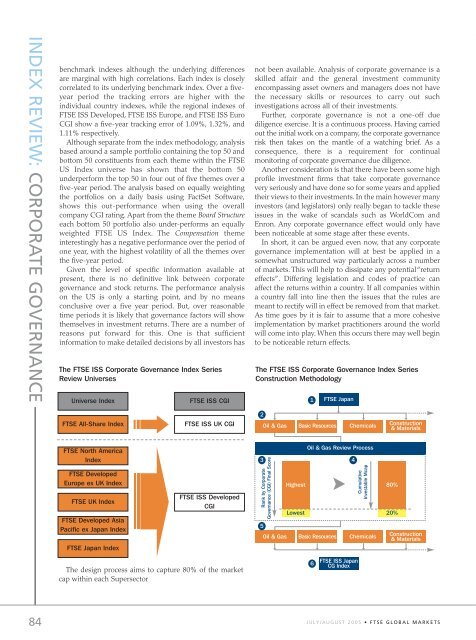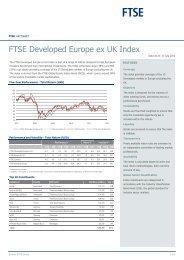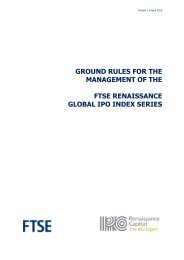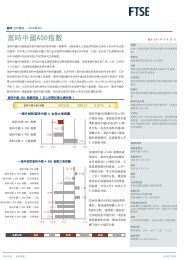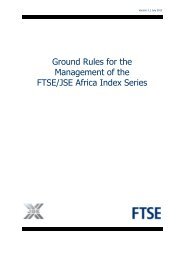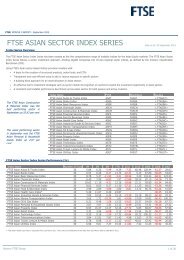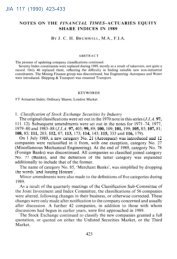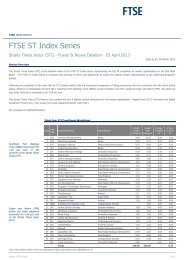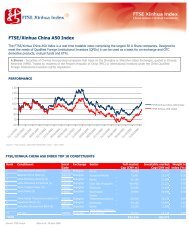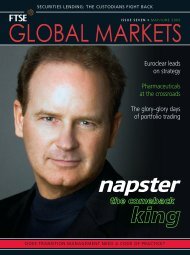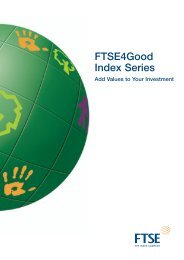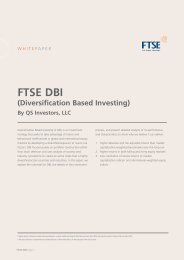You also want an ePaper? Increase the reach of your titles
YUMPU automatically turns print PDFs into web optimized ePapers that Google loves.
INDEX REVIEW: CORPORATE GOVERNANCE<br />
84<br />
benchmark indexes although the underlying differences<br />
are marginal with high correlations. Each index is closely<br />
correlated to its underlying benchmark index. Over a fiveyear<br />
period the tracking errors are higher with the<br />
individual country indexes, while the regional indexes of<br />
<strong>FTSE</strong> ISS Developed, <strong>FTSE</strong> ISS Europe, and <strong>FTSE</strong> ISS Euro<br />
CGI show a five-year tracking error of 1.09%, 1.32%, and<br />
1.11% respectively.<br />
Although separate from the index methodology, analysis<br />
based around a sample portfolio containing the top 50 and<br />
bottom 50 constituents from each theme within the <strong>FTSE</strong><br />
US <strong>Index</strong> universe has shown that the bottom 50<br />
underperform the top 50 in four out of five themes over a<br />
five-year period. The analysis based on equally weighting<br />
the portfolios on a daily basis using FactSet Software,<br />
shows this out-performance when using the overall<br />
company CGI rating. Apart from the theme Board Structure<br />
each bottom 50 portfolio also under-performs an equally<br />
weighted <strong>FTSE</strong> US <strong>Index</strong>. The Compensation theme<br />
interestingly has a negative performance over the period of<br />
one year, with the highest volatility of all the themes over<br />
the five-year period.<br />
Given the level of specific information available at<br />
present, there is no definitive link between corporate<br />
governance and stock returns. The performance analysis<br />
on the US is only a starting point, and by no means<br />
conclusive over a five year period. But, over reasonable<br />
time periods it is likely that governance factors will show<br />
themselves in investment returns. There are a number of<br />
reasons put forward for this. One is that sufficient<br />
information to make detailed decisions by all investors has<br />
The <strong>FTSE</strong> ISS Corporate Governance <strong>Index</strong> <strong>Series</strong><br />
Review Universes<br />
Universe <strong>Index</strong><br />
<strong>FTSE</strong> All-Share <strong>Index</strong><br />
<strong>FTSE</strong> North America<br />
<strong>Index</strong><br />
<strong>FTSE</strong> Developed<br />
Europe ex UK <strong>Index</strong><br />
<strong>FTSE</strong> UK <strong>Index</strong><br />
<strong>FTSE</strong> Developed Asia<br />
Pacific ex Japan <strong>Index</strong><br />
<strong>FTSE</strong> Japan <strong>Index</strong><br />
<strong>FTSE</strong> ISS CGI<br />
<strong>FTSE</strong> ISS UK CGI<br />
<strong>FTSE</strong> ISS Developed<br />
CGI<br />
The design process aims to capture 80% of the market<br />
cap within each Supersector<br />
not been available. Analysis of corporate governance is a<br />
skilled affair and the general investment community<br />
encompassing asset owners and managers does not have<br />
the necessary skills or resources to carry out such<br />
investigations across all of their investments.<br />
Further, corporate governance is not a one-off due<br />
diligence exercise. It is a continuous process. Having carried<br />
out the initial work on a company, the corporate governance<br />
risk then takes on the mantle of a watching brief. As a<br />
consequence, there is a requirement for continual<br />
monitoring of corporate governance due diligence.<br />
Another consideration is that there have been some high<br />
profile investment firms that take corporate governance<br />
very seriously and have done so for some years and applied<br />
their views to their investments. In the main however many<br />
investors (and legislators) only really began to tackle these<br />
issues in the wake of scandals such as WorldCom and<br />
Enron. Any corporate governance effect would only have<br />
been noticeable at some stage after these events.<br />
In short, it can be argued even now, that any corporate<br />
governance implementation will at best be applied in a<br />
somewhat unstructured way particularly across a number<br />
of markets. This will help to dissipate any potential “return<br />
effects”. Differing legislation and codes of practice can<br />
affect the returns within a country. If all companies within<br />
a country fall into line then the issues that the rules are<br />
meant to rectify will in effect be removed from that market.<br />
As time goes by it is fair to assume that a more cohesive<br />
implementation by market practitioners around the world<br />
will come into play. When this occurs there may well begin<br />
to be noticeable return effects.<br />
The <strong>FTSE</strong> ISS Corporate Governance <strong>Index</strong> <strong>Series</strong><br />
Construction Methodology<br />
2<br />
3<br />
Oil & Gas<br />
Rank by Corporate<br />
Governance (CGI) Final Score<br />
Highest<br />
Lowest<br />
1<br />
Basic Resources<br />
<strong>FTSE</strong> Japan<br />
Oil & Gas Review Process<br />
<strong>FTSE</strong> ISS Japan<br />
CG <strong>Index</strong><br />
Chemicals<br />
5<br />
Oil & Gas Basic Resources Chemicals<br />
6<br />
4<br />
Cumulative<br />
Investable Mcap<br />
Construction<br />
& Materials<br />
80%<br />
20%<br />
Construction<br />
& Materials<br />
JULY/AUGUST 2005 • <strong>FTSE</strong> GLOBAL MARKETS


